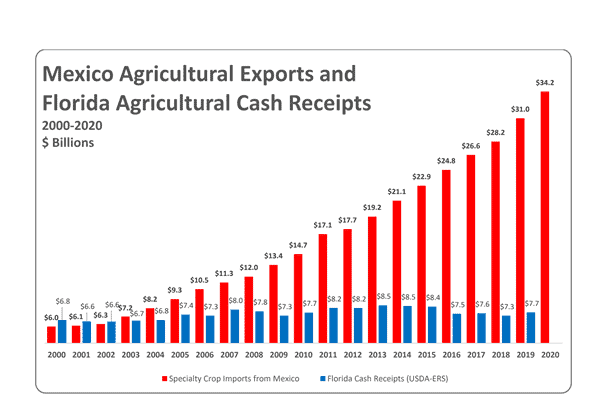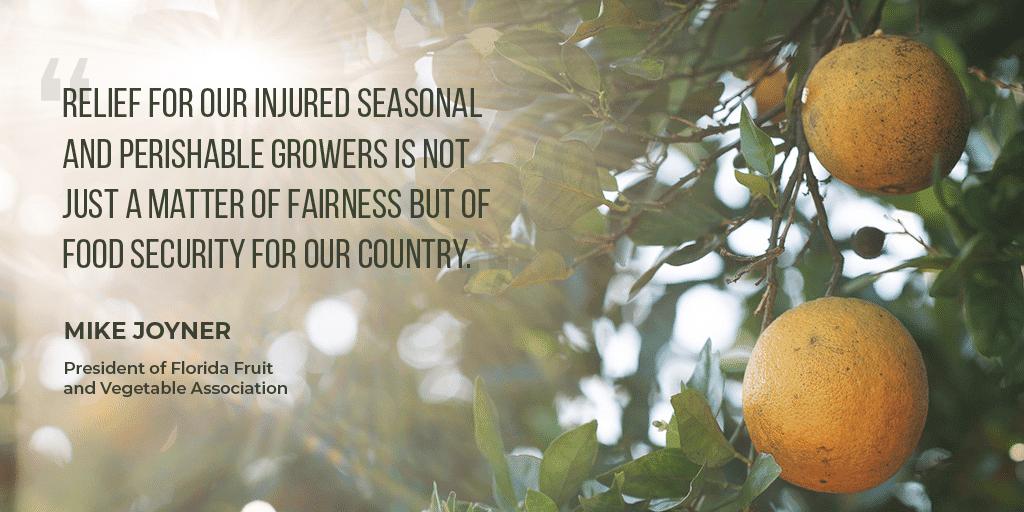Florida Agriculture Sounds the Alarm on Mexican Import Trade
A new report exposes the $4 billion impact of Mexican imports on the Florida economy.
On August 30, 2021, Florida Agriculture Commissioner Nikki Fried released a report prepared by the Florida Department of Agriculture and Consumer Services (FDACS) highlighting the consequences of increasing fruits and vegetable exports on the Florida economy and agricultural community.

Due to their humid subtropical climates, Florida and Mexico produce a similar variety of agricultural goods throughout the entire year, while a vast majority of U.S. ag production hibernates. This report sheds light on the economic impacts of increasing Mexican imports on primary Florida-grown commodities, including bell peppers, tomatoes, strawberries, and blueberries.
FDACS Report Highlights: How Mexican Exports Impact Florida Agriculture
Data gathered from the FDACS estimates that each year, Florida farmers lose between 10 to 20 percent of their total sales to Mexico’s expansion of agricultural export trade. The impact of this loss trickles down to the Florida economy at large.
- $1.31 to $2.63 billion decline in annual sales for Florida’s produce industry;
- 17,870 to 35,741 jobs lost in Florida; and
- $1.99 to $3.99 billion in annual losses for the Florida economy overall.
These statistics could become even more startling if the accelerated rate of Mexican imports maintains its course. Newly released data from the USDA shows that Mexico remains the top exporter of fruits and vegetables to the U.S. by a wide margin. In fact, the FDACS report notes an astounding 580 percent increase in specialty crop imports from Mexico between 2000 and 2020.
Protecting the Future of American Fruit and Vegetable Growers
The findings of this report are less than surprising for those close to the industry, but the statistical evidence provides a significant push towards legislative action. Mike Joyner, President of Florida Fruit and Vegetable Association, took the time to speak with AgAmerica about these latest findings and emphasizes the silver lining within the data.
“This report confirms what we are unfortunately seeing in the field,” says Joyner. “American growers of seasonal and perishable fruits and vegetables are under unsustainable pressure from growing volumes of unfairly subsidized and/or dumped produce from foreign suppliers.” According to Joyner, the International Trade Commission (ITC) is currently in the midst of creating similar reports on cucumbers, squash, and more. These reports are expected to be complete before the end of the year and will play an important role in establishing solutions that level the playing field for U.S. specialty crop farmers.
One such solution is the Defending Domestic Produce Production Act, a bill that was re-introduced in 2021 but awaits a congressional hearing to move forward. This bill would create safeguards for U.S. fruit and vegetable growers that would defend against unfair trading practices. When these reports are finalized, a hearing will likely follow. Joyner points out that, “we need congressional action that will deliver immediate, effective and enforceable relief.”
He also shares that a suspension agreement could be another potential solution to provide a competitive advantage for U.S. farmers sooner rather than later, as renegotiating the U.S.-Mexico-Canada trade agreement would be unlikely and take years to complete. “Sugar has a suspension agreement; tomatoes have a suspension agreement,” says Joyner. “We could come to a place where seasonable and perishable fruits and vegetables have a suspension agreement from the USMCA rather than opening it back up.”
Regardless of the future, one silver lining in the FDACS report is it provides statistical evidence of the consequences of import reliance. Findings from this report and others like it will help with establishing a process that protects our farmers and, in turn, our domestic food security as a nation.

As an advocate for the future of American agriculture, AgAmerica stands in support of these hardworking families that keep our domestic food supply system resilient.
Stay informed on the latest news updates impacting the industry by visiting our trade and legislation page or sign up for the AgAmerica newsletter to receive biweekly updates straight to your inbox.






